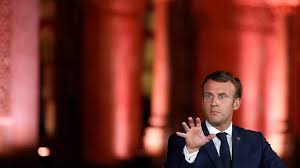By Weedah Hamzah and Pol O Gradaigh

Lebanon’s political leaders have agreed to form a new government within 15 days and pursue wide-ranging reforms, French President Emmanuel Macron says.
“Now it is up to the Lebanese actors to agree to the technicalities of putting this plan into effect,” he said after talks in Beirut with the country’s top leaders and political parties.
It was Macron’s second visit to the former French colony since a huge explosion in Beirut port on August 4 that devastated much of the city, killed more than 180 people, and led to a renewed outpouring of anger against the country’s political class.
The French president said Lebanese leaders had unanimously agreed to reforms in the electricity sector, capital controls, an audit of the financial sector and central bank, and a fight against smuggling and corruption.
Macron had earlier warned international aid, apart from immediate humanitarian assistance, would be conditional on reforms in those areas.
He proposed holding a conference to review political progress in Paris in late October, in tandem with a conference on international aid under the auspices of the United Nations.
Macron said he would himself visit Lebanon again in December.
The French president said it was not up to him to offer a seal of approval to Mustapha Adib, the diplomat designated on Monday by President Michel Aoun to head the next government.
But he said Adib’s career promised “professionalism and probity” and he enjoyed broad support from political parties.
The parties had agreed he should quickly form a government of “honest” professionals with an understanding of their brief rather than haggling over party nominees, Macron said.
Adib was also “lucid” about the fact that the public did not see him as a “saviour,” Macron said.
“He knows that … because he is the product of political forces who no longer have the trust of the people,” the French president added.
But Macron was also critical of demonstrators, who clashed with police in central Beirut while he was holding talks.
Protests against Lebanon’s government, sparked by a dire economic crisis and a failing electricity system, have gained new energy since the August 4 blast, which has been blamed on a huge cargo of highly explosive fertilizer confiscated by customs and left for six years in a port warehouse.
The protesters were not united and had failed to produce a leader, Macron noted.
Macron earlier marked Lebanon’s centenary by planting a cedar tree at the Jaj cedar reserve in Jbeil, north of Beirut, to mark the 100th anniversary of Lebanon’s creation.
Lebanon gained independence from France in 1943.
Risky bet
Macron says he’s making a “risky bet” by working to avoid a political collapse in Lebanon, but is limited in what he can achieve.
“It’s the last chance for this system,” the French president told POLITICO in an interview while en route from Paris to Beirut Monday evening.
“It’s a risky bet I’m making, I am aware of it … I am putting the only thing I have on the table: my political capital.”
Macron is in the Middle Eastern country and former French protectorate for the second time within a month to try to chart a way forward based on reforms in exchange for a bailout. The country has been reeling from a long-standing political and financial crisis, in addition to the resurgence of the coronavirus and the massive explosion that ripped through Beirut’s port in August, killing nearly 200 and prompting the resignation of Hassan Diab as prime minister.
After weeks of French pressure to nominate a so-called credible figure to the premiership, political parties agreed to put forward diplomat Mustapha Adib as the new prime minister on Monday — just hours before Macron’s arrival.
The French president has emerged as the only global heavyweight to have offered the country’s leaders a potential path to safety, though his critics say he isn’t doing enough.
Macron warned the next three months will be “fundamental” for real change to happen, and if it doesn’t, he will switch tack, taking punitive measures that range from withholding a vital international financial bailout to imposing sanctions against the ruling class.
Macron rejected accusations that he personally chose Adib and made a deal with Iran.
“I don’t know him, I didn’t choose him, and it’s not my job to interfere or approve,” he said.
Macron claimed he’s exerting pressure in Lebanon in a way that hasn’t been done before by visiting the country in such quick succession; holding frank, long and repeated conversations with the ruling class; threatening to withhold aid and impose sanctions, among other things.
With / Australian Associated Press

Leave a Reply
You must be logged in to post a comment.